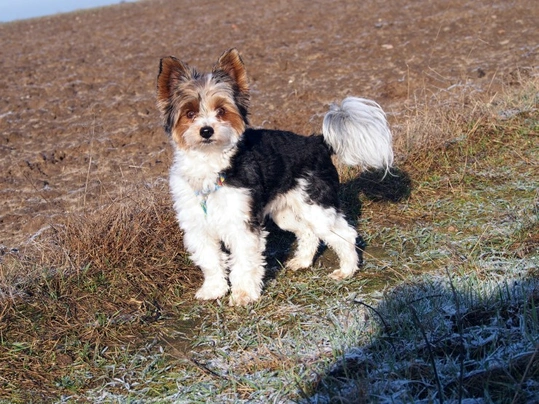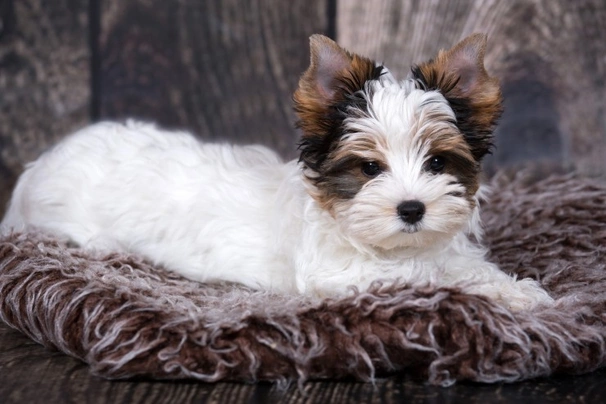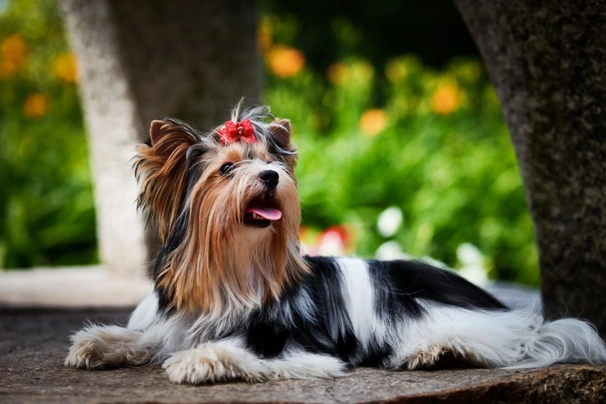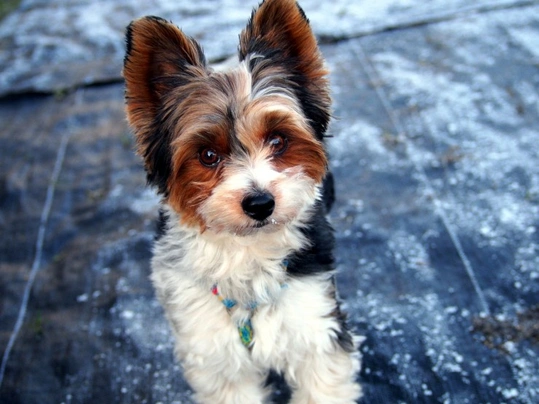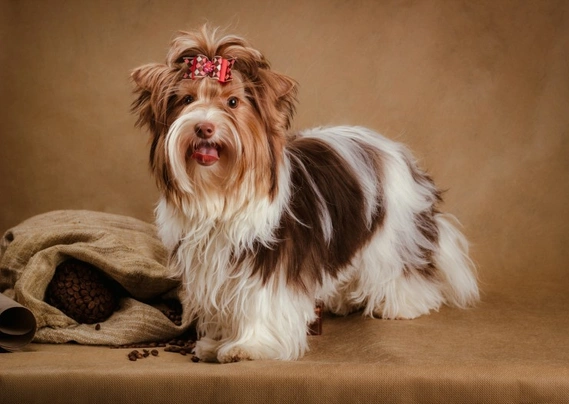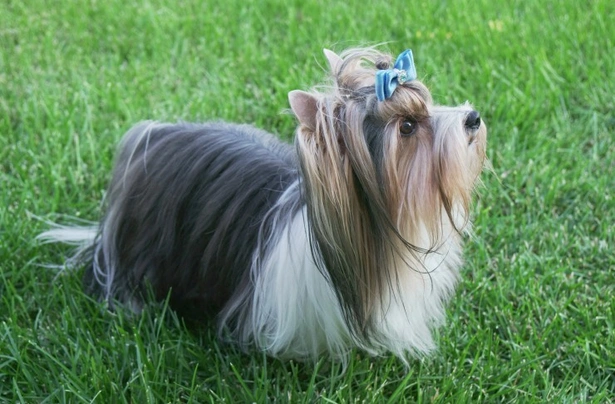Biewer Terrier
Pros
Cons
Introduction of the Biewer Terrier
Biewer Terriers are relatively new to the dog world having come about when a recessive gene from a pair of Yorkshire Terriers produced a unique piebald puppy. Normally Yorkies are slate grey and tan or cream so this piebald puppy intrigued and delighted German breeders Werner and Gertrud Biewer who decided to start selectively breeding dogs with an end goal being to create more puppies with such an attractive coat colour.
Today although still fairly unknown in the UK other than with enthusiasts of the Yorkshire Terrier these charming little dogs with their lovely coats are starting to make an impact on the dog world thanks to their charming looks and kind loyal affectionate natures. Biewer Terriers are the perfect companion for people of all ages because they are never overly demanding.
History of the Biewer Terrier
The Biewer Terrier was first developed in Germany when Yorkshire Terrier breeders Mr. and Mrs. Biewer found an unusual puppy in 1984 in one their litters. The puppy had a piebald genetic recessive gene that led to a very unique coat colour. The breeders named the puppy Schneefloeckchen von Friedheck which translated from German means "Snowflake".
Mr. & Mrs. Biewer found the puppy to be quite beautiful and began a selective and careful breeding programme with an end goal being to produce more of these piebald coloured puppies. They decided to call the dogs that boasted having white markings "Biewer Yorkshire Terriers à la Pom Pon" and continued their breeding programme. In 1989 the Biewer was officially recognised by the Allgemeiner Club der Hundefreunde Deutschland (ACH) the German equivalent of the Kennel Club.
It was not until 2003 that the Biewer Terrier was introduced to America's dog scene where they were an immediate success. However a lot of controversy began when American breeders began crossing Biewers with Yorkshire Terriers which was deemed wrong since both the Biewer and the Yorkshire Terrier were already established as two separate breeds by official clubs. Breeders in the US named their dogs "Biewer Yorkies" and argued their case to continue doing so.
A study was carried out by geneticists working at Mars Veterinary who established that the Biewer Terrier is indeed a breed in its own right and that they are definitely not tricoloured Yorkshire Terriers. Based on the results of the research a new breed standard was drawn up with the breed being registered as Biewer Terriers.
In 2014 the Biewer Terrier was accepted as a Foundation Breed by the American Kennel Club although not all US breeders agree with the standard or the breed’s given name preferring to call their dogs Biewer Yorkshire à la Pom Pon the Biewer or Biewer Yorkie. With this said breeders are still not encouraged to cross Biewer Terriers with Yorkshire Terriers as a way of preserving the breed’s true pedigree.
Today although less well known than the Yorkshire Terrier Biewer Terriers have found a large fanbase in the UK as well as elsewhere in the world. Prospective owners might need to go on a waiting list for the pleasure of sharing their homes with one of these charming little dogs and it's important to ask breeders about a Biewer Terrier's ancestry to make sure both parents are indeed Biewers and that they do not have Yorkshire Terrier in their bloodlines.
Interesting facts about the breed
- Is the Biewer Terrier a vulnerable breed? No they have fast become one of the more popular small breeds in the UK although anyone wishing to get a Biewer Terrier would need to register their interest with breeders and go on a waiting list for the pleasure of doing so
- Biewer Terriers came about quite by accident when German breeders found a unique coloured puppy in a litter of Yorkshire Terriers
- The breed was originally called Biewer Yorkshire Terriers à la Pom Pon but the name was changed because the "à la Pom Pon" was only added for fun
- The "Yorkshire" in the breed's name was dropped when the breed was officially recognised by the American Kennel Club
- Biewer Terriers owe their unique piebald colouring to a recessive gene
- Before the law on tail docking came into effect Biewer Terriers had their tails docked. However the law banning the procedure came into effect in 2007 which means that tail docking is now illegal with the exception being for some working breeds and if a dog suffers from some sort of health issue that requires their tails to be docked. The procedure must be agreed and authorised before being performed by a qualified vet.
Appearance of the Biewer Terrier
Height at the withers: Males 22 cm Females 22 cm
Average weight: Males 3.1 kg Females 3.1 kg
The Biewer is a typical toy terrier in appearance with luxurious silky hair that hangs straight from the middle of their backs down each side of their body as well as from the bottom of the skull and from the full length of the tail. They are compact neat little dogs and their bodies are slightly longer than they are tall. Their heads are very slightly rounded with dogs boasting a moderate stop. Muzzles are short and neat with Biewers having a perfect scissor bite where their upper teeth neatly overlap their lower ones.
Their eyes are medium in size and a dark brown colour being either almond-shaped or round with black rims and Biewers always boast having a keen intelligent look about them. Ears are v-shaped and small being completely covered in hair which dogs carry upright. They are set moderately apart and to the back of a dog's head adding to their charming appeal.
Their necks are quite long in relation to the rest of their bodies which allows these little terriers to carry their heads high. Their neck blends neatly into a dog's shoulders. They have perfectly straight well-muscled front legs that are nicely covered with hair. Their toplines are level and dogs have a nice width between their chests and moderately well sprung ribs.
Loins are short but powerful and their bellies are slightly tucked up adding to the Biewers athletic appearance. Back legs are straight and nicely covered in hair. Their feet are round and nails can be either black or white. Their tails are nicely covered with long hair that forms a plume which dogs carry high with a curve in it.
When it comes to their coat the Biewer Terrier boasts having a long silky luxurious and flowing coat that's super soft in texture. The hair on a Biewer's head is long which people usually tie up in a top knot. These lovely little terriers can be the following colours:
- Black and white with gold/tan marking on their heads and around their backsides
- Blue and white with gold/tan marking on their heads and around their backsides
Biewer Terriers can have white in their coats and their toplines should be either blue or black.
Gait/movement
When a Biewer Terrier moves they do so very daintily covering a lot of ground when they do. Much like a Yorkshire Terrier they have a free-moving gait and dogs keep their toplines nice and straight when they are on the move.
Faults
Prospective Biewer Terrier owners should be wary of any puppies or dogs that show any sort of exaggeration whether in their looks or conformation and that extra-small dogs often come with many health issues which includes painful dental problems so they are best avoided. A responsible breeder would always ensure that puppies they produce are of a good size and conformation and would avoid breeding extra small dogs for these reasons. Males should have both testicles fully descended into their scrotums.
Temperament of the Biewer Terrier
Biewer Terriers are known to be large dogs in a very small dog's body. They are energetic highly intelligent affectionate and incredibly loyal to their families. However they can be a little strong willed at times which is one of the reasons these little dogs need to be gently taught who is boss in a household. When they know their place in the "pack" Biewers are generally well-behaved and fun to have around.
They can be a little aloof and wary of strangers and have been known to be a little aggressive around other animals which is why they need to be well socialised from a young age. Biewers much like their Yorkshire Terrier cousins can be a little yappy at times with the end result of them becoming quite demanding if they are allowed to always get their own way which is a typical ‘terrier’ trait and why these little dogs need to know who is the boss in a household. The problem is that Biewers are highly intelligent and therefore very good at getting what they want using their charming delicate looks to their advantage. Therefore they tend to get away with things that a larger dog would not be allowed to.
With this said in the right hands and with the correct amount of socialisation and training Biewers can be taught how to behave and it will prevent them from developing "Small Dog Syndrome" which can see dogs becoming neurotic and hard to live with. Biewers have earned a reputation of being hard to housetrain but with patience perseverance and understanding it is possible to teach these little terriers to do their business outside it may just take a little longer than with some other breeds.
They are a good choice of family pets in households where the children are older and therefore know how to behave around such small and fragile dogs. Biewers are not the best choice for families with younger children or toddlers but with this said they make wonderful companions for people of all ages.
Are they a good choice for first time owners?
Biewer Terriers are the perfect choice for first time dog owners because they are so amenable and people-oriented loving nothing more than to please and to entertain the people they love. With this said they are better suited to families with older children rather than toddlers or younger kids because of their small size and delicate frame. They are wonderful companions for older people because they are not overly demanding on the exercise front although they do like to be kept entertained.
What about prey drive?
Biewer Terriers might be small in stature but they are still "terriers" and are always very happy to chase anything that moves which includes the cat from next door. Much like a Yorkshire Terrier they are tenacious and are never keen to give up once they decide to chase something even when an animal or rodent goes “to ground”. As such care should always be taken when a Biewer Terrier is around any pets and animals they don't already know.
What about playfulness?
Biewer Terriers have a very playful side to their natures and love to entertain and be entertained. They are very clever and quickly learn what pleases an owner. They also like to test the limits and boundaries from time to time to see how much they can get away with as well as just for the fun of it.
What about adaptability?
Biewers are highly adaptable dogs and providing they are given enough daily physical exercise combined with as much mental stimulation to prevent boredom from setting in they are just as happy living in an apartment in town as they are living in a house in the country.
What about separation anxiety?
Biewer Terriers thrive on human company and they form strong ties with their families. As such dogs are never very happy when they find themselves left on their own for longer periods of time. They are better suited to people who either work from home or in households where one person stays at home when everyone else is out so they are never alone for any length of time which could see a dog suffering from separation anxiety. This can lead to them being destructive around the home and barking incessantly which is a dog's way of relieving any stress they are feeling and a way to keep themselves entertained.
What about excessive barking?
Biewers are known to like the sound of their own voices a little too much which is something that needs to be gently nipped in the bud when a dog is still young being careful not to frighten them. With this said like their Yorkie cousins Biewers are "yappy" and like to bark for the sake of it or when they want some attention.
Do Biewer Terriers like water?
Biewers are not especially fond of water and being such small dogs they can quickly get cold even when the weather is warm. Care should always be taken when walking a Biewer off the lead anywhere near more dangerous watercourses just in case a dog decides to leap in and then needs rescuing because they cannot get out of the water on their own.
Are Biewer Terriers good watchdogs?
Biewer Terriers are feisty by nature which is the “terrier” in them. They do not realise how small they are which means they are very effective "watchdogs" to have around a home. They are constantly on the alert for something to bark at and they are always quick off the mark to let their owners know when strangers are about or when something they don't like is going on around them. Much like a Yorkshire Terrier Biewers are tenacious and they are never prepared to give up too easily when they decide to do something which includes protecting their environment and owners.
Intelligence / Trainability of the Biewer Terrier
Biewers are highly intelligent little dogs and they are very quick when it comes to learning new things. However this includes the good and the bad which owners should bear in mind when sharing a home with a puppy or young dog. The problem is that sometimes a Biewer is too intelligent for their own good and know exactly how to wrap their owners around their little paws to get what they want. This can lead to them becoming more and more demanding which can quickly escalate into these small dogs ruling the roost.
Their training must start as early as possible and it must be consistent for Biewers to understand their place in the pack. It cannot be stressed enough the importance for Biewer puppies to be well socialised so they mature into confident more outgoing yet calm adult dogs. They are quite sensitive by nature especially when they are going through their "puppy" stage and as such they do not respond well to any sort of harsh correction or heavy-handed training methods.
They do however answer well to positive reinforcement but it's important not to overdo the "treats" because these little dogs are prone to put on too much weight all too easily. It is far better to offer fewer food rewards and to make sure they are high value ones rather than offer lower quality treats when a dog gets something right which is particularly important when housetraining a Biewer Terrier.
Biewer Terriers are very cute and it is all too easy to spoil them when they first arrive in their new homes. However owners need to start out as they mean to go on to avoid puppies from developing "small dog syndrome" which can see a Biewer being wilful and unruly making it harder to live with them. All dogs should be taught what is acceptable behaviour and what is not no matter how big or small they are. Laying down rules and boundaries also helps establish who is the alpha dog in a household and puppies are always happier and better behaved when they know what an owner expects of them. The first commands a Biewer puppy should be taught are as follows:
- Come
- Sit
- Stay
- Quiet
- Leave it
- Down
- Bed
Children and other
Biewer Terriers are not the best choice for people with toddlers and young children because these little dogs can be a little snappy if they feel threatened in any way. They are also very small and quite fragile which means they are more susceptible to suffering from broken bones. They are a good choice in households where the children are older and therefore know how to behave around dogs and more especially when they are interacting with such small dogs.
They are known to be a little aggressive around other animals and this includes cats which is why they need to be well socialised from a young age although it would be a mistake to trust a Biewer around other smaller pets because of their "terrier" traits. They can be aggressive towards other dogs too bearing in mind that Biewers have no idea of how small they really are. As such care must be taken when out on a walk in a public place where other dogs are commonly being walked too.
Health of the Biewer Terrier
The average life expectancy of a Biewer Terrier is between 12 and 15 years when properly cared for and fed an appropriate good quality diet to suit their ages.
Much like their Yorkshire Terrier cousins the Biewer although a relatively new breed is known to suffer from a few hereditary and other health issues which are worth knowing about if you are hoping to share a home with one of these lively and loyal terriers. The health issues most commonly seen in the breed includes the following:
- Hypoglycemia
- Distichiae
- Hypoplasia of dens
- Legge-Calve-Perthes syndrome
- Portosystemic shunt
- Retinal Dysplasia
- Luxating Patella
- Collapsed Trachea
- Portosystemic Shunt
- Cataracts
- Progressive retinal atrophy (PRA) – dogs should be eye tested
- Primary lens luxation (PLL) – dogs should be eye tested
- Chiari malformation Syringomyelia – dogs should be tested
- Eye infections
- Allergic Dermatitis
- Alopecia
- Hypothyroidism
- A sensitivity to anaesthetic
It is also worth noting that when bred too small Biewer Terriers can suffer from health issues associated with their small size and their conformation. This includes dental issues that sees dogs retaining their milk teeth because there is not enough room for them to push through in a dog's mouth and the problem needs to be surgically corrected.
What about vaccinations?
Biewer Terrier puppies would have been given their initial vaccinations before being sold but it is up to their new owners to make sure they have their follow-up shots in a timely manner with the vaccination schedule for puppies being as follows:
- 10 -12 weeks old bearing in mind that a puppy would not have full protection straight away but would be fully protected 2 weeks after they have had their second vaccination
There has been a lot of discussion about the need for dogs to have boosters. As such it's best to talk to a vet before making a final decision on whether a dog should continue to have annual vaccinations which are known as boosters.
What about spaying and neutering?
A lot of vets these days recommend waiting until dogs are slightly older before spaying and neutering them which means they are more mature before undergoing the procedures. As such they advise neutering males and spaying females when they are between the ages of 6 to 9 months old and sometimes even when a dog is 12 months old.
Other vets recommend spaying and neutering dogs when they are 6 months old but never any earlier unless for medical reasons. With this said many breeds are different and it is always advisable to discuss things with a vet and then follow their advice on when a dog should be spayed or neutered.
What about obesity problems?
Some Biewer Terriers gain weight after they have been spayed or neutered and it's important to keep an eye on a dog's waistline just in case they do. If a dog starts to put on weight it's important to adjust their daily calorie intake and to up the amount of exercise they are given. Older dogs too are more prone to gaining weight and again it's essential they be fed and exercised accordingly because obesity can shorten a dog's life by several years. The reason being that it puts a lot of extra strain on a dog's internal organs including the heart which could prove fatal.
What about allergies?
Biewer Terriers are prone to suffering from quite a few allergies and it's important for a dog to see a vet sooner rather than later if one flares up. Allergies can be notoriously hard to clear up and finding the triggers can be challenging. With this said a vet would be able to make a dog with an allergy more comfortable while they try to find out the triggers which could include the following:
- Certain dog foods that contain high levels of grain and other cereal fillers
- Airborne pollens
- Dust mites
- Environment
- Flea and tick bites
- Chemicals found in everyday household cleaning products
Participating in health schemes
All responsible Biewer Terrier breeders would ensure that their stud dogs are tested for known hereditary and congenital health issues known to affect the breed by using the following schemes:
- Progressive retinal atrophy (PRA)
- Annual test for Primary lens luxation (PLL)
- Testing for Chiari malformation syringomyelia (CMSM)
What about breed specific breeding restrictions?
The Biewer Terrier is not a Kennel Club breed as such there are no breed specific breeding restrictions for the breed. However prospective owners should always contact reputable breeders who only use Biewer Terriers in their breeding programmes and avoid any breeder who crosses Biewers with Yorkshire Terriers.
What about Assured Breeder Requirements?
Because the Biewer Terrier is not Kennel Club registered there are no KC Assured Breeder requirements.
Caring for the Biewer Terrier
As with any other breed Biewers need to be groomed on a regular basis to make sure their coats and skin are kept in tip-top condition. They also need to be given regular daily exercise to ensure they remain fit and healthy. On top of this they need to be fed good quality food that meets all their nutritional needs throughout their lives.
Caring for a Biewer Terrier puppy
Biewer Terrier puppies are boisterous and full of life which means it's essential for homes and gardens to be puppy-proofed well in advance of their arrival. A responsible breeder would have well socialised their puppies which always leads to more outgoing confident and friendly dogs right from the word go. With this said any puppy is going to feel vulnerable when they leave their mother and littermates which must be taken into account. The longer a puppy can remain with their mother the better although it should never be for too long either.
It's best to pick a puppy up when people are going to be around for the first week or so which is the time needed for a puppy to settle in. Puppy-proofing the home and garden means putting away any tools and other implements that a boisterous puppy might injure themselves on. Electric wires and cables must be put out of their reach because puppies love chewing on things. Toxic plants should be removed from flowerbeds and the home too.
Puppies need to sleep a lot to grow and develop as they should which means setting up a quiet area that's not too out of the way means they can retreat to it when they want to nap and it's important not to disturb them when they are sleeping. It's also a good idea to keep "playtime" nice and calm inside the house and to have a more active "playtime" outside in the garden which means puppies quickly learn to be less boisterous when they are inside.
The documentation a breeder provides for a puppy must have all the details of their worming date and the product used as well as the information relating to their microchip. It is essential for puppies to be wormed again keeping to a schedule which is as follows:
- Puppies should be wormed at 6 months old
- They need to be wormed again when they are 8 months old
- Puppies should be wormed when they are 10 months old
- They need to be wormed when they are 12 months old
Things you'll need for your puppy
There are certain items that new owners need to already have in the home prior to bringing a new puppy home. It's often a good idea to restrict how much space a puppy plays in more especially when you can't keep an eye on what they get up to bearing in mind that puppies are often quite boisterous which means investing in puppy gates or a large enough playpen that allows a puppy the room to express themselves while keeping them safe too. The items needed are therefore as follows:
- Good quality puppy or baby gates to fit on doors
- A good well-made playpen that's large enough for a puppy to play in so they can really express themselves as puppies like to do
- Lots of well-made toys which must include good quality chews suitable for puppies to gnaw on bearing in mind that a puppy will start teething anything from when they are 3 to 8 months old
- Good quality feed and water bowls which ideally should be ceramic rather than plastic or metal
- A grooming glove
- A slicker brush or soft bristle brush
- Dog specific toothpaste and a toothbrush
- Scissors with rounded ends
- Nail clippers
- Puppy shampoo and conditioner which must be specifically formulated for use on dogs
- A well-made dog collar or harness
- A couple of strong dog leads
- A well-made dog bed that's not too small or too big
- A well-made dog crate for use in the car and in the home that's large enough for a puppy to move around in
- Baby blankets to put in your puppy's crate and in their beds for when they want to nap or go to sleep at night
Keeping the noise down
All puppies are sensitive to noise including Biewer Terrier puppies. It's important to keep the noise levels down when a new puppy arrives in the home. TVs and music should not be played too loud which could end up stressing a small puppy out.
Keeping vet appointments
As previously mentioned Biewer Terrier puppies would have been given their first vaccinations by the breeders but they must have their follow up shots which is up to their new owners to organise. The vaccination schedule for puppies is as follows:
- 10 -12 weeks old bearing in mind that a puppy would not have full protection straight away but would only be fully protected 2 weeks after they have had their second vaccination
When it comes to boosters it's best to discuss these with a vet because there is a lot of debate about whether a dog really needs them after a certain time. However if a dog ever needed to go into kennels their vaccinations would need to be fully up to date.
What about older Biewer Terriers when they reach their senior years?
Older Biewers need lots of special care because as they reach their golden years they are more at risk of developing certain health concerns. Physically a dog's muzzle may start to go grey but there will be other noticeable changes too which includes the following:
- Coats become coarser
- A loss of muscle tone
- Biewers can either become overweight or underweight
- They have reduced strength and stamina
- Older dogs have difficulty regulating their body temperature
- They often develop arthritis
- Immune systems do not work as efficiently as they once did which means dogs are more susceptible to infections
Older dogs change mentally too which means their response time tends to be slower as such they develop the following:
- They respond less to external stimuli due to impaired vision or hearing
- They tend to be a little pickier about their food
- They have a lower pain threshold
- Become intolerant of any change
- Often an older dog can feel disorientated
Living with a Biewer Terrier in their golden years means taking on a few more responsibilities but these are easily managed and should include taking a look at their diet the amount of exercise they are given how often their dog beds need changing and keeping an eye on the condition of their teeth.
Older Biewers need to be fed a good quality diet that meets their needs at this stage of their lives all the while keeping a close eye on a dog's weight. A rough feeding guide for older dogs is as follows bearing in mind they should be fed highly digestible food that does not contain any additives:
- Protein content should be anything from 14 – 21%
- Fat content should be less than 10%
- Fibre content should be less than 4%
- Calcium content should be 0.5 – 0.8%
- Phosphorous content should be 0.4 – 0.7%
- Sodium content should be 0.2 – 0.4%
Older Biewers don't need to be given the same amount of daily exercise as a younger dog but they still need the right amount of physical activity to maintain muscle tone and to prevent a dog from putting on too much weight. All dogs need access to fresh clean water and this is especially true of older dogs when they reach their golden years because they are more at risk of developing kidney disorders.
Grooming of the Biewer Terrier
Biewers have long silky and flowing coats which are made up of hair very like that of people and as such they do not shed in the same way as other dogs. Their hair also grows continuously throughout the year rather than in short bursts. As such they are quite high maintenance when it comes to keeping things tidy. Their coats need to be brushed every day to prevent any tangles and matts from forming.
Their top-knots need to be brushed daily too before being tied back up to prevent the hair from becoming torn and ragged. It's also important to keep an eye on their back-ends and to make sure they are clean washing them when necessary. Because Biewers are prone to dental issues it's essential for their teeth to be checked and cleaned every day so that if there is a problem it can be dealt with sooner rather than later.
They also need to be professional groomed on a regularly basis and if a dog is not being shown their coats can be clipped or trimmed which makes it a lot easier to keep things tidy and looking good in between visits to a grooming parlour. Unlike other breeds as previously mentioned Biewers much like their Yorkshire Terrier cousins do not shed their coats in the same way as other dogs because their hair grows throughout the year.
It's also important to check a dog's ears on a regular basis and to clean them when necessary. If too much wax builds up in a dog's ears it can lead to a painful infection which can be hard to clear up. In short prevention is often easier than cure when it comes to ear infections.
Exercise of the Biewer Terrier
Biewers might be small in stature but they are energetic little dogs and as such they need to be given the right amount of daily exercise and mental stimulation for them to be truly happy well-rounded dogs. Because they are so intelligent if they are left to their own devices for any length of time they quickly become bored and will look for ways to keep themselves busy and entertained. This often sees these energetic little dogs developing some unwanted behaviours which includes excessive barking being destructive around the home and they can suffer from separation anxiety too.
A good 30-minutes exercise is ideal but being terriers Biewers enjoy running around a secure back garden as often as possible to really let off steam bearing in mind that the fencing must be extremely good to keep these little dogs in. The other thing to bear in mind is that these little dogs feel the cold and would need to wear a coat when outside during the colder winter months whether they are out on a walk or running around a back garden.
With this said Biewer puppies should not be over exercised and this includes being allowed to jump up or down from furniture running up and down stairs because their joints and bones are still growing and too much pressure on them could result in causing a dog a few problems later in their lives.
Feeding of the Biewer Terrier
If you get a Biewer puppy from a breeder they would give you a feeding schedule and it's important to stick to the same routine feeding the same puppy food to avoid any tummy upsets. You can change a puppy's diet but this needs to be done very gradually always making sure they don't develop any digestive upset and if they do it's best to put them back on their original diet and to discuss things with the vet before attempting to change it again.
Older dogs are not known to be fussy or finicky eaters but this does not mean you can feed them a lower quality diet. It's best to feed a mature dog twice a day once in the morning and then again in the evening making sure it's good quality food that meets all their nutritional requirements. It's also important that dogs be given the right amount of exercise so they burn off any excess calories or they might gain too much weight which can lead to all sorts of health issues. Obesity can shorten a dog's life by several years so it's important to keep an eye on their waistline from the word go.
It's also essential for these little dogs to be fed at the same time every day and not to make them wait too long in between meals because they are prone to suffer from Hypoglycaemia which is especially true of puppies and younger Biewers.
Feeding guide for a Biewer Terrier puppy
Puppies need to be fed a highly nutritious good quality diet for them to develop and grow as they should. As a rough guide a Biewer Terrier puppy can be fed the following amounts every day making sure their meals are evenly spread out throughout the day and it's best to feed them 3 or 4 times a day:
- 2 months old - 49g to 78g depending on a puppy's build
- 3 months old - 54g to 88g depending on a puppy's build
- 4 months old - 55g to 92g depending on a puppy's build
- 5 months old - 55g to 92g depending on a puppy's build
- 6 months old - 47g to 84g depending on a puppy's build
- 7 months old - 40g to 75g depending on a puppy's build
- 8 months old - 39g to 66g depending on a puppy's build
- 9 months old - 39g to 66g depending on a puppy's build
Once a puppy is 10 months old they can be fed adult dog food.
Feeding guide for an adult Biewer Terrier
Once fully mature an adult Biewer Terrier must be fed a good quality diet to ensure their continued good health. As a rough guide an adult Biewer can be fed the following amounts every day:
- Dogs weighing 3 kg can be fed 63 g to 72 g a day
Biewer Terrier price
If you are looking to buy a Biewer Terrier you may have to agree to go on a waiting list because these charming little dogs are difficult to find. You would need to pay anything upwards of £1000 for a well-bred puppy. The cost of insuring a male 3-year-old Biewer Terrier in northern England would be £19.67 a month for basic cover but for a lifetime policy this would set you back £42.89 a month (quote as of February 2018). When insurance companies calculate a pet's premium they factor in several things which includes where you live in the UK and a dog's age and whether they have been neutered or spayed.
When it comes to food costs you need to buy the best quality food whether wet or dry to feed your dog throughout their lives making sure it suits the different stages of their lives. This would set you back between £15 - £20 a month. On top of this you would need to factor in veterinary costs if you want to share your home with a Biewer and this includes their initial vaccinations their annual boosters the cost of neutering or spaying your dog when the time is right and their yearly health checks all of which quickly adds up to over £600 a year.
As a rough guide the average cost to keep and care for a Biewer Terrier would be between £30 to £60 a month depending on the level of insurance cover you opt to buy for your dog but this does not include the initial cost of buying a healthy well-bred Biewer Terrier puppy.
Buying advice
When visiting and buying any puppy or dog there are many important things to consider and questions to ask of the breeder/seller. You can read our generic puppy/dog advice here which includes making sure you see the puppy with its mother and to verify that the dog has been wormed and microchipped.
Biewer Terriers have fast become one of the more popular small breeds breed both in the UK and elsewhere in the world which means that well-bred puppies can often command a lot of money. As such with Biewer Terriers there is specific advice questions and protocols to follow when buying a puppy which are as follows:
- Beware of online scams and how to avoid them. You may see online and other adverts by scammers showing images of beautiful Biewer Terrierpuppies for sale at very low prices. However the sellers ask buyers for money up front before agreeing to deliver a puppy to a new home. Potential buyers should never buy a puppy unseen and should never pay a deposit or any other money online to a seller. You should always visit the pet at the sellers home to confirm they are genuine and make a note of their address.
- As previously touched upon Biewer Terriers are now among some of the more popular breeds in the UK. As such there are many amateur breeders/people who breed from a dam far too often so they can make a quick profit without caring for the welfare of the puppies their dam or the breed in general. Although not Kennel Club registered breeders should follow the KC breeding guidelines which state that a dam can only produce 4 litters and she must be between a certain age to do so. Anyone wishing to buy a Biewer Terrier puppy should think very carefully about who they purchase their puppy from and should always ask to see the relevant paperwork pertaining to a puppy's lineage their vaccinations and their microchipping.
- Prospective owners should be very careful when considering buying an extra small puppy because all too often they suffer from very serious health issues and no responsible breeder would purposefully breed dogs so they are too small which could see a puppy suffering from dental issues and other conditions too.

Biewer Terriers
£1,250
Biewer Yorkie Pups ONLY THREE LEFT
£1,000

